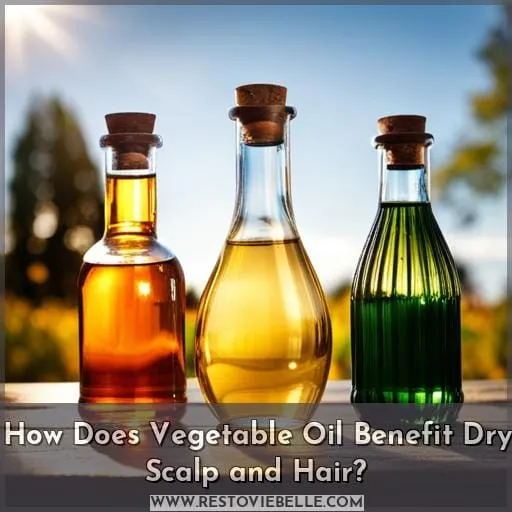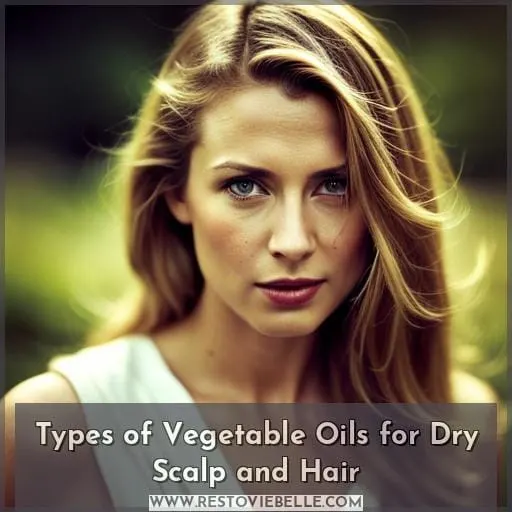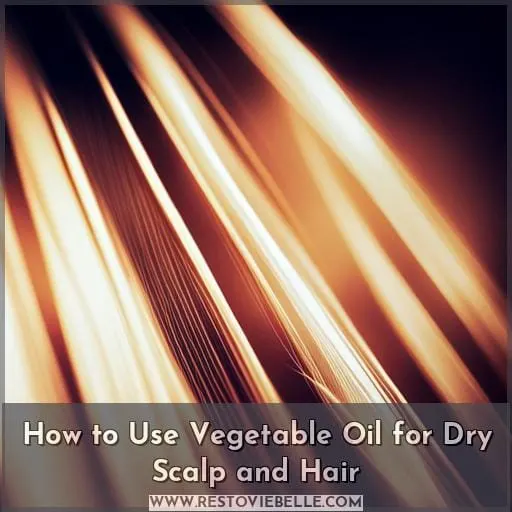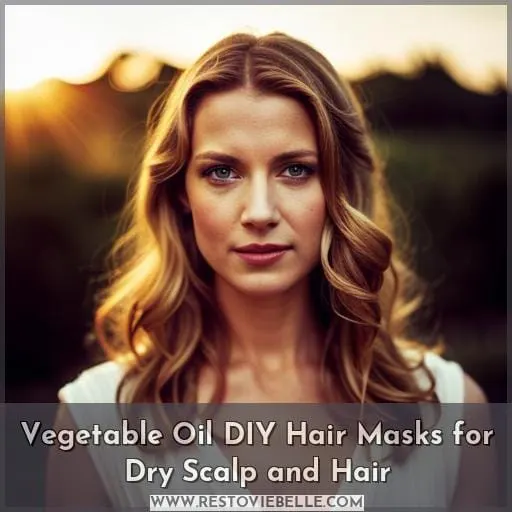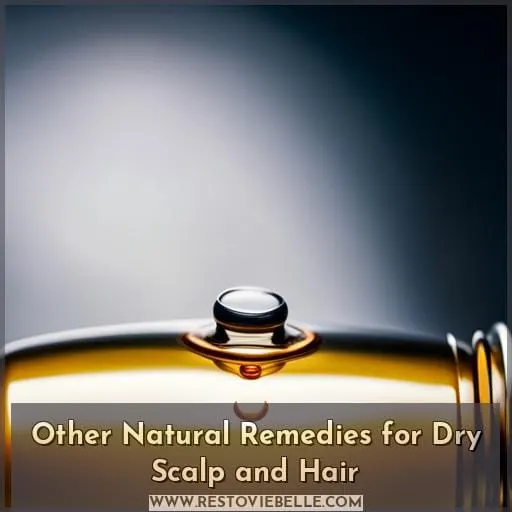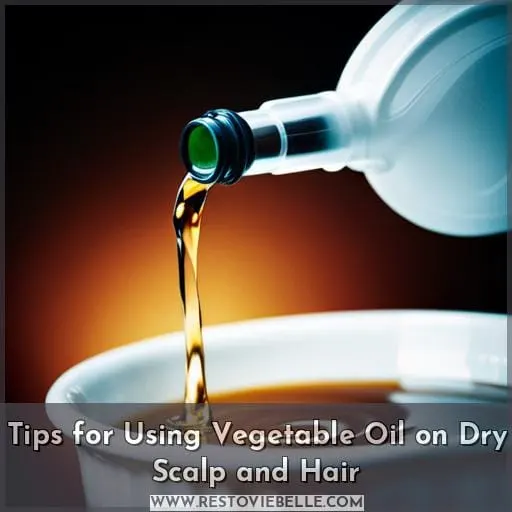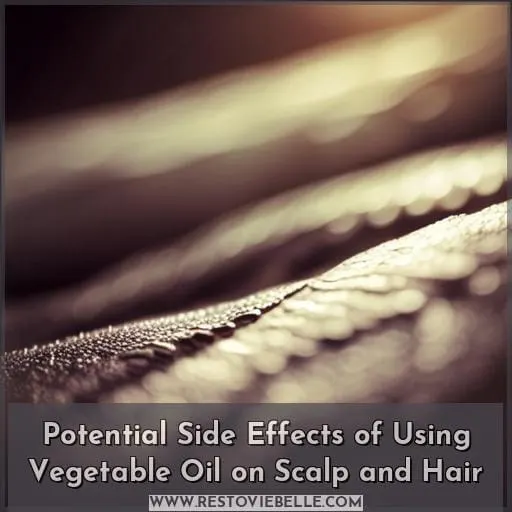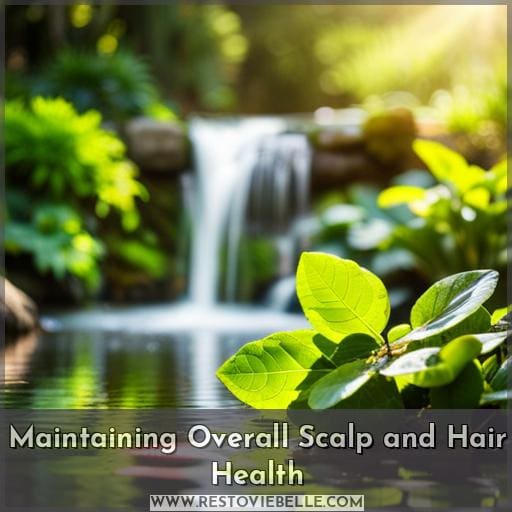This site is supported by our readers. We may earn a commission, at no cost to you, if you purchase through links.
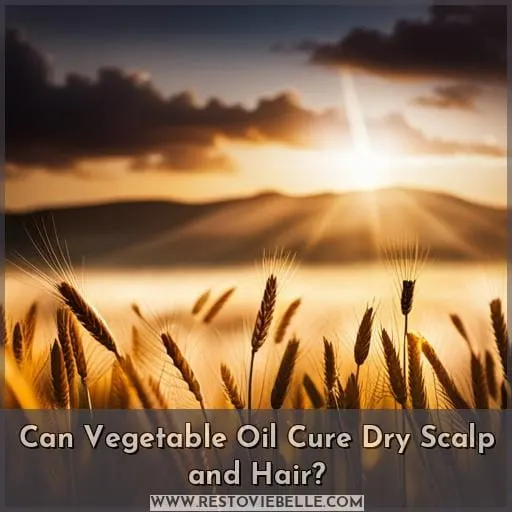 With over 50 million Americans suffering from dry scalp and hair, finding the right product to help restore their health can be a challenge.
With over 50 million Americans suffering from dry scalp and hair, finding the right product to help restore their health can be a challenge.
This article examines if vegetable oil is an effective remedy for dry scalp and hair by exploring its benefits, types of oils available, how to use them correctly, as well as other natural remedies that can help.
We’ll also provide some helpful tips on choosing the best vegetable oil products so you know what to look out for when shopping around.
Table Of Contents
- Key Takeaways
- What Causes Dry Scalp and Hair?
- How Does Vegetable Oil Benefit Dry Scalp and Hair?
- Types of Vegetable Oils for Dry Scalp and Hair
- How to Use Vegetable Oil for Dry Scalp and Hair
- Vegetable Oil DIY Hair Masks for Dry Scalp and Hair
- Other Natural Remedies for Dry Scalp and Hair
- Tips for Using Vegetable Oil on Dry Scalp and Hair
- Potential Side Effects of Using Vegetable Oil on Scalp and Hair
- When to Seek Professional Help for Dry Scalp and Hair
- Maintaining Overall Scalp and Hair Health
- Conclusion
Key Takeaways
- Vegetable oils are rich in vitamins, antioxidants, and fatty acids, making them beneficial for scalp and hair health.
- Vegetable oils can be added to shampoo or conditioner to prevent further hair drying.
- Warm oil massages improve hydration and overall scalp health.
- Overnight treatments with vegetable oil restore moisture and soothe dryness.
What Causes Dry Scalp and Hair?
A lack of moisture, harsh chemicals in shampoos and conditioners, and environmental damage are common factors that can lead to dry scalp and hair. To maintain the natural oil balance on your scalp, hydration is key. Adding a few drops of vegetable oil, such as avocado or coconut, into your shampoo or conditioner can help prevent further drying out of the strands.
A massage with warm oils gives you an immediate boost in hydration, as well as increased circulation to improve overall scalp health. An overnight treatment using a DIY hair mask made from mayonnaise mixed with vegetable oil is also effective for providing deep nourishment for both the roots and ends while preventing breakage caused by dryness.
Natural remedies like aloe vera juice applied directly onto damp hair provide lasting relief while helping moisturize locks without weighing them down too much. Vegetable oils offer plenty of benefits when used regularly and will help reduce any signs associated with dryness, including frizziness, dullness, hair loss, and dandruff.
How Does Vegetable Oil Benefit Dry Scalp and Hair?
The use of vegetable oil for dry scalp and hair is a popular choice due to its moisturizing properties. Vegetable oils are rich in vitamins, minerals, antioxidants, and essential fatty acids that work together to nourish the skin on your scalp while also working to keep it hydrated.
Moisturizing Properties
You can rely on natural oils to moisturize your scalp and hair, relieving it from dandruff, breakage, and dryness. Vegetable oil is one of the most popular choices for these purposes due to its high fatty acid content, which helps nourish the skin.
A regular oil massage using vegetable oil helps keep the scalp hydrated while promoting circulation and reducing inflammation. It also provides a protective barrier against environmental damage as well as helping retain overall moisture in both hair strands and follicles.
Additionally, this type of oil has been known to have antifungal properties that can help prevent conditions like seborrheic dermatitis or psoriasis from occurring on sensitive scalps.
- Scalp Hydration: Regular vegetable oil massages promote healthy circulation and reduce inflammation on scalps.
- Oil Massage: Helps maintain hydration levels in both hair strands and follicles.
- Hair Moisture: Acts as a protective layer against external factors such as sunrays or seawater.
- Dryness Relief: Antifungal properties may help control seborrheic dermatitis/dandruff flare-ups.
- Natural Remedies: Opting for all-natural remedies like vegetable oils are safe alternatives.
Nourishing Vitamins and Antioxidants
By nourishing your hair with vitamins and antioxidants, vegetable oil can help restore the moisture balance of a dry scalp. It’s rich in omega-3 fatty acids that keep hair hydrated for longer periods. Vegetable oil also offers antioxidant benefits, which protect against environmental damage such as UV rays from the sun or seawater.
Additionally, it helps to strengthen and soften follicles near the scalp, preventing breakage caused by dryness or dandruff buildup on your head. Vegetable oils are some of nature’s most effective natural remedies for healthy scalps and beautiful locks! With its nourishment properties combined with other essential oils like coconut oil or almond oil, you can ensure that both your scalp and tresses remain moisturized while avoiding any further irritation due to dryness prevention techniques like brushing too often or using heated styling tools excessively.
Scalp Health Promotion
Revitalizing your tresses with vegetable oil gives your scalp a much-needed boost of nourishment. It can help to hydrate and protect hair from further damage, while providing the essential vitamins and antioxidants needed for optimal health.
DIY oil treatments are also an accessible way to promote healthy hair growth. Natural remedies like olive, jojoba, or avocado oils work best in combination with other ingredients such as eggs or honey for maximum effect.
For those looking to try out various oils on their scalp, it’s important to research different types carefully before use and consider which would be most suitable for their individual needs.
With careful selection of quality vegetable oils that suit you best, you could soon see improved shine and hydration in no time – just what your dry strands need!
Types of Vegetable Oils for Dry Scalp and Hair
Are you searching for the best vegetable oil to help with your dry scalp and hair? Coconut oil, olive oil, argan oil, and jojoba oil are all great options that can provide hydration and nourishment. These oils have been used for centuries to improve scalp health as well as add shine and softness to dull locks.
Coconut Oil
Rejuvenate your hair with the nourishing properties of coconut oil.
- Moisturizes and softens hair from root to tip.
- Protects hair protein structure from damage.
- Has antifungal and antibacterial properties to promote scalp health.
- Easily absorbed for quick results and can enhance other hair treatments.
Coconut oil, abundant in fatty acids, is an excellent emollient for dry scalp and hair. Its penetrating nutrients hydrate hair follicles and increase shine. Regular scalp massage prevents flakes and irritation.
Olive Oil
An olive oil scalp massage will nourish your tresses from root to tip.
Here are some tips for using olive oil on your hair:
Benefits:
- Moisturizes hair and scalp
- Softens hair
- Adds shine
- Improves manageability
How to Use:
- As a scalp massage before shampooing
- As a hair mask mixed with yogurt or egg
- Warm slightly before applying
- Apply to damp hair focusing on ends
Cautions:
- Use high quality, pure olive oil
- May weigh down very fine hair
- Test for skin sensitivity
- Oil can stain; protect clothing and surfaces
Olive oil brings hydration that dry, brittle hair yearns for. Choose organic extra virgin for optimal nourishment.
Argan Oil
Your precious hair soaks up the argan oil’s antioxidants and vitamins. This Moroccan elixir contains fatty acids that hydrate your scalp. It battles frizz and dryness by locking in moisture. Before bed, apply argan oil and let it work its magic overnight.
You can also try this argan hair mask: Mix argan oil, honey, and aloe. Apply the mixture to your scalp and hair. Allow it to sit for 30 minutes, then rinse. The vitamins and emollients leave your locks smooth as silk.
Jojoba Oil
Jojoba hydrates your parched scalp like rain on cracked earth. It’s an effective vegetable oil for hair care, offering multiple benefits. It moisturizes the scalp, adds shine to dull hair, and prevents breakage. Compared to other oils like Avocado or Olive oil, Jojoba has a unique chemical structure.
Coconut oil also offers similar advantages, but Jojoba’s smaller molecules can access deeper layers of the skin easier. It also provides antioxidant protection from environmental damage caused by sun exposure or salty seawater air.
To get all its benefits without any harsh chemicals involved, try making a homemade jojoba mask.
How to Use Vegetable Oil for Dry Scalp and Hair
Using vegetable oil for dry scalp and hair can be an effective way to restore moisture and shine. A scalp massage, hot oil treatment, or overnight treatment are all easy ways to apply the oils.
Scalp Massage
Massaging your scalp with avocado oil can reduce dandruff and protect hair follicles. Scalp hydration is key for dry, itchy, flaky scalps. Vegetable oils like avocado may provide relief while moisturizing the skin and hair.
Hair oiling techniques, such as deep conditioning scalp massages, are an effective natural remedy. They help deliver nutrients to the roots of your strands. To perform this DIY massage, apply a small amount of warm vegetable oil onto clean hands.
Then, gently rub it into the scalp in circular motions for two to three minutes per session.
This massage also helps improve circulation, which can stimulate growth on thinning areas or bald patches caused by excessive scratching due to dryness or other factors. For added nourishment, try creating homemade masks using vegetable oils mixed with other ingredients like yogurt, egg yolk, honey, and essential oils.
Hot Oil Treatment
Treat your hair to a hot oil massage with avocado, almond, or olive oil for an intense conditioning experience. Hot oil treatments can repair dry scalp and help maintain healthy locks by adding moisture and nourishment.
Benefits include added shine without greasiness, reduction of frizziness due to heat protection from the oils’ antioxidants, as well as prevention of dandruff caused by irritation that comes with extreme dryness.
DIY overnight treatments are easy: just apply the warmed up choice of oil onto damp hair before bedtime and shampoo in the morning! Vegetable oils like coconut or sunflower also work wonders when looking for moisturizing masks or deep conditioners – but be sure to read labels carefully for hidden chemicals!
With essential oils like lavender on board too, you’ll have everything needed for beautiful tresses while enjoying a relaxing spa-like session at home.
Overnight Treatment
For a nourishing overnight treatment, consider applying a high-quality vegetable oil to your scalp and hair.
Overnight application of vegetable oil helps restore moisture and soothe dryness and irritation on the scalp.
DIY hair masks with natural ingredients like olive or coconut oils offer an excellent alternative if you don’t want to use store-bought products. They are highly effective in conditioning the strands and providing relief from itching due to scaliness caused by lack of moisture.
With regular use, these treatments will help keep your locks looking healthy while helping you maintain strong and shiny tresses!
Vegetable Oil DIY Hair Masks for Dry Scalp and Hair
Are you seeking a natural remedy to treat your dry scalp and hair? Try using vegetable oil in combination with other ingredients like avocado, yogurt, or honey. These DIY masks are known to provide moisture and nourishment while promoting healthy hair growth.
Avocado and Vegetable Oil Hair Mask
Mixing avocado and vegetable oil can create a nourishing hair mask that provides hydration, softness, and strength to the dry scalp and locks. Avocado is packed with vitamins, antioxidants, and monounsaturated fats, which help protect the scalp from environmental damage while moisturizing it deeply.
Vegetable oils such as coconut or olive provide essential fatty acids for boosting shine. Together, they form an effective DIY remedy for improving hair health without harsh chemicals or salon visits.
Yogurt and Vegetable Oil Hair Mask
Soak your strands in a veggie oil-yogurt blend for instant hydration. Yogurt contains proteins that help moisturize and strengthen hair. Pair it with nourishing oils like olive or coconut to combat dry scalp. Massage the mask into your roots and lengths, let sit, then rinse for soft, hydrated locks.
- Combine 1/2 cup yogurt with 2 tablespoons oil
- Apply from roots to ends
- Let sit for 20-30 minutes
- Rinse thoroughly
- Shampoo and condition as usual
Yogurt contains proteins and lactic acid that help moisturize hair and scalp while reducing frizz. Pairing yogurt with oils like olive, coconut, or almond oil boosts the hair mask’s hydrating and nourishing abilities.
Massage the yogurt-oil blend into the scalp and lengths to increase blood circulation and nourish hair follicles. Leave the mask on for 20-30 minutes before rinsing thoroughly. Finish with a gentle shampoo and conditioner.
Honey and Vegetable Oil Hair Mask
Apply a honey and vegetable oil hair mask for deep conditioning and intense hydration that’ll nourish your parched locks from root to tip.
The emollient properties of vegetable oil soften hair and provide a protective layer to lock in moisture.
Honey is a natural humectant that draws and seals in hydration. Its antibacterial action also soothes dry, itchy scalps.
Simply warm two tablespoons each of honey and oil like olive or coconut. Apply thoroughly to damp hair and let sit for 20 minutes before rinsing.
The honey and oil will penetrate strands to hydrate hair and scalp for touchable softness and shine.
Other Natural Remedies for Dry Scalp and Hair
If you are looking for natural remedies to treat your dry scalp and hair, aloe vera gel is an excellent option. Rich in minerals, amino acids, vitamins B12 and C, as well as enzymes that help soothe the scalp while providing moisture to the hair strands.
Aloe Vera Gel
Soothe your locks with the cooling properties of aloe vera gel to revive dry and damaged hair. Aloe vera is a popular natural remedy for many skin problems, including sunburns, acne, and even psoriasis.
Mixing it with vegetable oil can help restore moisture back into the strands while reducing irritation on the scalp caused by dandruff or an overly dry environment.
To use this home remedy, mix one part vegetable oil to three parts aloe vera gel in an applicator bottle. Then, apply liberally throughout your hair before rinsing off after 20 minutes or so.
Apple Cider Vinegar Rinse
Try an apple cider vinegar rinse to combat dry scalp and restore softness to your hair. Use a 1:1 ratio of organic apple cider vinegar mixed with water after shampooing. Massage it into the hair, focusing on the scalp, and leave it for a few minutes before rinsing thoroughly.
The acetic acid in vinegar helps balance pH, remove buildup, stimulate circulation for hair growth, and add shine. Make sure to dilute it to avoid irritation. Many DIY recipes use apple cider vinegar rinses as natural remedies for dry scalp and hair.
Tea Tree Oil
Tea tree oil can tingle your tresses with its therapeutic properties. It’s an essential oil known to help scalp care and promote hair health. With regular use, it may reduce dandruff, itchiness, or irritation of the scalp.
Tea Tree Oil is also non-toxic and has anti-inflammatory properties that make it ideal for DIY hair care routines targeting dryness or itchiness of the scalps due to seborrheic dermatitis or psoriasis too!
It’s highly recommended not to apply tea tree oil directly on the skin as vegetable oils are usually used as carrier oils to prevent potential skin irritations when using this essential oil along with other natural remedies like honey, etc.
However, one should always do a patch test before incorporating any new ingredient into their routine, especially if they have sensitive skin.
Tips for Using Vegetable Oil on Dry Scalp and Hair
When it comes to using vegetable oil for dry scalp and hair, choose cold-pressed and organic oils. Before applying the oil, conduct a patch test on your skin to check for any allergies or sensitivities.
After applying the oil onto your scalp or hair, make sure you rinse it off thoroughly with shampoo.
Choose Cold-Pressed and Organic Oils
For maximum effectiveness, choose cold-pressed and organic oils when looking to nourish your scalp and hair. Cold-pressed oils are unrefined, providing more beneficial properties compared to regular vegetable oil.
Organic options can guarantee no hidden chemicals, so you get the full natural moisturizing benefits without any nasty surprises.
DIY hair masks with natural remedies like mayonnaise or egg yolks can also be a great option. Just make sure you patch test before using them on your skin! Remember that using high-quality pure oil is essential.
Conduct a Patch Test
Before using any natural oils on your scalp and hair, make sure to conduct a patch test to ensure you won’t have an allergic reaction—it’s as easy as pie!
A patch test allows you to check for skin sensitivity or allergies before applying oil directly onto the scalp. To perform this simple allergy testing process, apply a small amount of vegetable oil onto an area of clean skin like the inner arm and wait 24 hours.
If irritation occurs after that time frame has passed, avoid using that particular product on your head or body in future treatments.
When selecting oils for dry scalp treatment, make sure they are cold-pressed and organic so they don’t contain synthetic ingredients that may aggravate sensitivities even further.
Allergy precautions will help protect against adverse reactions while taking care of your hair health naturally!
Rinse Thoroughly
After you’ve applied vegetable oil to your scalp and hair, make sure to rinse it out thoroughly. Use a gentle shampoo or mild soap-free cleanser that won’t strip away the natural oils in your hair. Focus on massaging the scalp while rinsing with lukewarm water for maximum hydration and conditioning benefits.
Make sure all traces of oil residue are removed. This will help prevent any dryness from occurring later on. Pay special attention when rinsing around the edges of your forehead, behind ears, and at the nape area where residue can get trapped more easily due to its proximity to skin folds or crevices in our head shape.
Focusing on proper technique during this step is key for successful scalp care!
Potential Side Effects of Using Vegetable Oil on Scalp and Hair
While moisturizing like a soothing balm, prolonged use of vegetable oil could clog pores. Though vegetable oil hydrates dry scalp, frequent or heavy application may lead to oily residue buildup. This blocks hair follicles and pores while trapping bacteria, potentially causing inflammation or infection.
Consider lighter oils with less greasiness, like grapeseed or jojoba, for regular use. Rotate treatments to minimize oil residue. Dilute oil with water or mix with apple cider vinegar as a clarifying rinse.
Massage oil to stimulate circulation then wash thoroughly. Natural remedies prevent dryness without overloading the scalp. Retain moisture by limiting washing, using sulfate-free shampoos, conditioning regularly and avoiding heat styling.
When to Seek Professional Help for Dry Scalp and Hair
You’d be wise to see a dermatologist if your scalp stays parched and your hair keeps splitting despite home treatments. A professional consultation can identify underlying conditions or allergies, suggest lifestyle changes, prescribe medications (if necessary), and help you develop an effective dandruff prevention plan.
Here are four signs that it’s time to seek professional advice:
- Persistent dryness with no improvement after trying different products or natural remedies.
- Heavy flaking on the scalp.
- Constant itching with redness of the skin.
- Hair loss in patches or receding hairline due to excessive scratching/picking at the scalp from irritation caused by dandruff/dryness.
With proper diagnosis and treatment, persistent issues like a dry scalp will become manageable – so don’t hesitate when seeking help from medical professionals for long-term health benefits!
Maintaining Overall Scalp and Hair Health
To maintain overall scalp and hair health, consider using natural oils like coconut oil or jojoba oil to nourish your tresses. For example, Christina found that her dry scalp was relieved after she used a weekly avocado mask followed by an almond oil treatment.
There are many ways you can use vegetable oils to improve your scalp and hair health.
| Remedy | Benefits | How To Use |
|---|---|---|
| Scalp Massage | Reduces dandruff & prevents breakage Stimulates hair growth & improves circulation | Warm the oil, apply to the scalp in circular motions |
| Hot Oil Treatment | Improves texture Adds shine | Heat up desired amount of vegetable/essential oils together in bowl Apply warm mixture directly onto wet or damp hairs from root-to-tip before showering |
| Overnight Treatment | Intensive conditioning treatment Strengthens weak follicles | Mix equal parts (e.g., 1/2 cup) honey + olive + castor + essential oils together if desired.Apply evenly throughout dampened strands from midshaft down.Cover with shower cap for 8 hours minimum |
| DIY Hair Masks | Rehydrating benefits | Mix mashed avocados+egg yolk+honey together until smooth..apply evenly into dampened strands starting at roots..leave on 30 minutes then rinse out thoroughly |
Natural Remedies
- Herbs such as nettle leaf tea – helps reduce shedding
- Fenugreek paste – rich source of protein which strengthens brittle locks
- Apple cider vinegar – balances pH levels resulting in healthier looking locks
- Hibiscus flower petals – promotes faster growing luscious manes
Using these simple yet effective treatments regularly will help replenish moisture back into parched scalps while providing protection against environmental damage caused by pollutants and UV rays.
Furthermore, eating nutritious foods packed with vitamins A&E (salmon etc.), Omega 3 fatty acids (avocado), iron(spinach), zinc(nuts) can also strengthen thinning locks whilst encouraging healthy new growth!
Conclusion
Tired of dealing with dry scalp and hair? Vegetable oil could be the answer you’re looking for. With its moisturizing properties, many types of vegetable oil can help restore your hair to its natural state.
Coconut, olive, argan, and jojoba oils can be used to massage your scalp, nourish your hair with a hot oil treatment, and even create deep overnight conditioning treatments.
When using vegetable oil, make sure to choose cold-pressed and organic varieties, do a patch test first, and rinse thoroughly.


